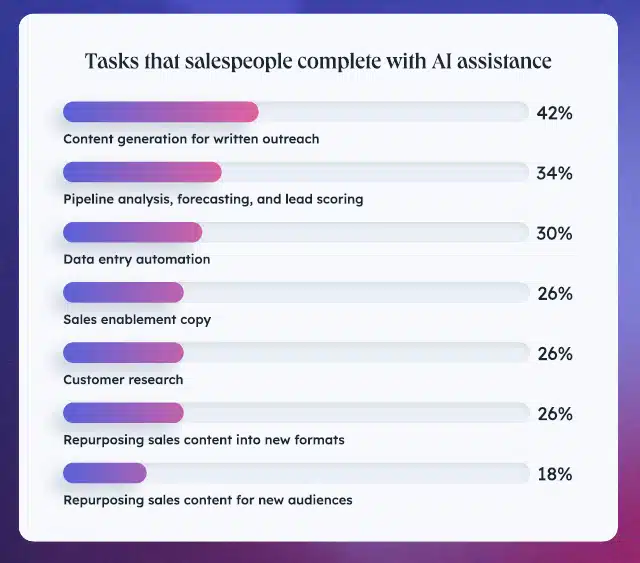Among the most promising technologies, AI for Sales is emerging as powerful tool to simplify the sales process, improve the customer experience and generate real results. Let’s see how.
AI for sales for effective selling
Artificial intelligence has the potential to revolutionize the sales industry with time-saving capabilities, deeper data analysis, and stronger forecasting potential.
As AI adapts to the needs of salespeople, the technology will continue to grow.
For example, integrating AI into CRM offers significant benefits, transforming sales management into a more efficient and personalized process. With AI, sales teams can automate repetitive tasks, such as collecting and analyzing customer data, managing follow-ups, and forecasting sales, allowing salespeople to focus on higher-value interactions.
AI can also provide suggestions based on predictive analytics, improving conversion rates and personalizing offers.
Finally, integration with CRM provides immediate access to detailed insights, enabling faster and more strategic decisions, with a direct impact on business growth.
HOW SALES PEOPLE USE AI FOR SALES?
The most common sales activities supported by AI include lead management automation, lead scoring, and personalization of communications. AI tools analyze large volumes of data to identify the most promising contacts, suggesting to salespeople which opportunities to follow up with higher priority.
They can also automate the sending of personalized emails and messages, adapting the tone and content based on the customer’s behavior and preferences. AI also supports follow-up management, reminding salespeople when is the best time to follow up with a prospect.
Finally, thanks to predictive analytics, it is possible to more accurately estimate the probability of closing a deal and optimize pricing and negotiation strategies.
According to the Hubspot AI Trends for Sales report: when salespeople use AI-based tools, they can increase their efficiency, close more sales opportunities, and become stronger communicators across internal and external teams.

BENEFITS OF AI FOR SALES

They automate repetitive tasks such as lead management, follow-up, and appointment scheduling, allowing sales people to focus on high-value interactions. Using predictive analytics, they help identify the most promising opportunities and personalize sales approaches based on customer behavior and preferences. They also provide real-time insights into sales performance, enabling faster, more effective strategic decisions. AI reduces deal closing times, improves conversion rates, and helps companies build stronger customer relationships, increasing revenue and competitiveness.
1. Reduce Sales Cycles and Increase Engagement
Advanced AI technologies such as Natural Language Processing (NLP) and Generative AI are opening up new opportunities to improve sales efficiency. Thanks to their ability to interact in real time with customers, AI assistants are able to resolve questions, guide users through the purchasing process and collect valuable data for personalizing offers.
When used to support B2B sales teams, AI assistants can reduce response times and improve interaction, creating a deeper connection with customers and accelerating the sales cycle. Additionally, thanks to AI, it is possible to personalize responses based on customer behavior, improving the likelihood of conversion.
2. Demand Generation and Lead Qualification
One of the most exciting aspects of AI is the ability to automate and optimize demand generation. Using AI Sales assistants allows you to automate many of your digital marketing activities, such as content distribution and lead interaction, while collecting crucial data for lead qualification.
With AI, you can implement predictive lead qualification, which allows you to more accurately identify sales opportunities and improve your targeting strategy. Additionally, AI Assistants can collect data during conversations, improving your forecasts for future sales and enabling more accurate planning.
3. Conversational Intelligence: The New Frontier
Conversational intelligence, which uses NLP to understand natural language, is changing the way we interact with customers. AI for Sales Assistants can analyze conversations between salespeople and customers, identifying coaching and improvement opportunities for sales teams.
Additionally, AI for Sales Assistants can be used as virtual agents for the first contact with the customer, directing them to the right person within the organization. Automating note-taking during customer conversations allows salespeople to better focus on the relationship and not on administrative tasks.
4. Sales Forecasting and Optimization
Artificial intelligence for sales not only optimizes interactions in real time, but is also a powerful ally in sales forecasting. Using predictive models, AI can estimate future revenue, identifying potential revenue shortfalls or surpluses compared to pre-established goals.
Predictive forecasting helps improve alignment between sales and marketing, unifying customer interaction data and enabling more effective management of the sales funnel. This helps reduce the cost of customer acquisition and optimize resource allocation.
5. Generative AI: a sales teammate
Generative AI is bringing sales into a new era, not just as a tool, but as a true teammate. With the ability to generate personalized content and contextualized responses, AI Assistants offer advanced support to sales teams. These tools can synthesize information, recommend future actions, and even generate optimized sales emails, saving valuable time for salespeople.
Bringing generative AI into sales is not without its challenges, especially when it comes to trust, both on the part of salespeople and customers. It is crucial that companies build trust with AI, constantly testing its outputs to ensure they are accurate and useful.
6. Balancing Risks and Opportunities with Generative AI
While generative AI can be a tremendous opportunity for sales, it is essential to carefully evaluate the risks associated with its implementation. The reliability of the information provided by AI, data security, and the fear that AI could replace salespeople are among the main concerns.
To maximize the benefits, companies must clearly communicate with their sales teams, explaining how AI can support human work, freeing salespeople from repetitive tasks and allowing them to focus on high-value interactions.
ConclusionS
Artificial intelligence is revolutionizing the world of sales. By automating and optimizing multiple aspects of the sales process, from lead acquisition to personalizing interactions, AI not only increases the effectiveness of sales teams, but also creates more engaging and satisfying customer experiences. The future of sales is certainly increasingly automated, but with the human element at the center, supported by the power of AI.

